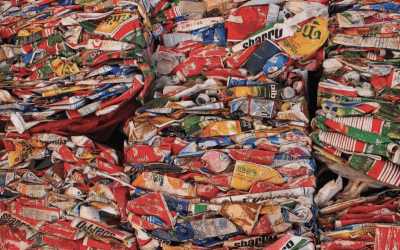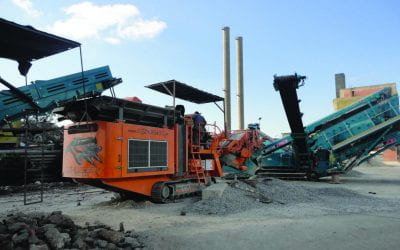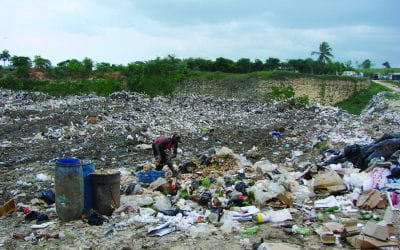First Take: Waste
Global Challenge, Latin American Lessons
Waste—its generation, collection and disposal—is a major global challenge in the 21st century. Cities are responsible for managing municipal waste. Solid waste management is, arguably, the single most important function of cities: waste that is not collected on a timely basis creates a public health hazard, and organic waste, collection vehicles, and most waste disposal methods, with the notable exception of recycling, contribute to greenhouse gas emissions. But the management of waste depends in large part on the global markets for recycled materials. The financial crisis that started in September 2008 exposed the interdependence of global markets and local supply of recycled materials. With the sudden drop in global demand for manufactured goods, the global demand for recycled materials—used as raw materials and packing materials—also dropped suddenly. Unsold recycled materials started to accumulate in ships, ports, warehouses, city streets and neighborhoods around the world as early as October 2008.
The issue of waste has long been of personal interest to me. In 1964, I made my first trip to Latin America with an international group of college students. Having grown up in India, I was on the lookout for similarities and differences between South Asia and Latin America. On that visit the waste pickers in Bogotá made a vivid impression on me, as they were dressed in what I considered to be modern Western clothes unlike the waste pickers of India, who dressed in traditional garments. Little did I know that 44 years later I would return to Bogotá to speak at the first international conference of waste pickers, including those from India, Egypt and Latin America (see the companion article in this magazine by Fernández and Chen).

The prevalence of recycling bins and trash receptacles show progress forward in the recycling efforts In Panajachel, Guatemala. The receptacles are not always used, however. Each day, sanitation comes to pick up the trash left in this alleyway. Photo by Kellie Cason O’Connor.
I couldn’t imagine that by 2014, during the recent World Cup tournament in Brazil, cooperatives of waste pickers were contracted in six out of the ten host cities to provide waste collection, transport and disposal services at the World Cup stadiums.
By then, the global action-research-advocacy network known as WIEGO (Women in Informal Employment: Globalizing and Organizing) I co-founded in 1997 had been engaged in improving the status of the working poor, especially women, in the informal economy for almost twenty years. WIEGO promotes stronger organizations of informal workers, better statistics and research on the informal economy, and a fairer policy and regulatory environment for the informal workforce, including waste pickers.
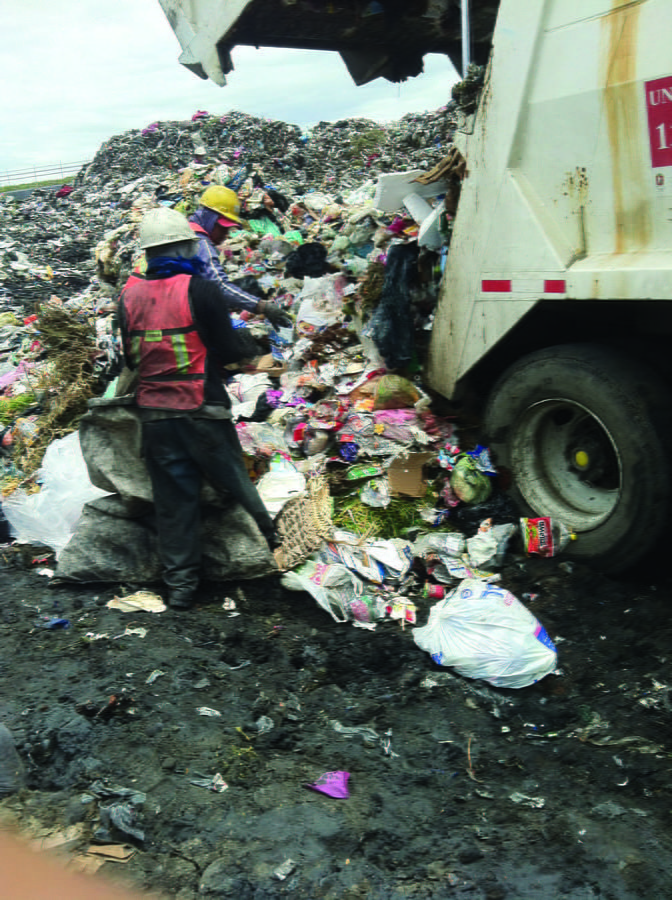
Private garbage collection in Mexico operates in exchange for voluntary donations to make up for inefficient public garbage services. Photo by Humberto Delgado.
Waste pickers are an important part of the story in Latin America, as more is being thrown away than ever. The World Bank estimates that the amount of solid waste generated in cities is growing faster than the rate of urbanization. The higher the income level and the rate of urbanization, the greater the amount of solid waste produced. OECD countries produce almost half of the world’s waste. Africa and South Asia produce the least waste. High-income countries have the highest collection rates and are most likely to dispose of waste to landfills or incinerators. Low-income countries have the lowest collection rates and are most likely to dispose of their waste in open dumps. However, low-income countries also have the largest numbers of informal waste pickers who collect, sort, and reclaim recyclables—thus reducing costs to the city and to the environment.
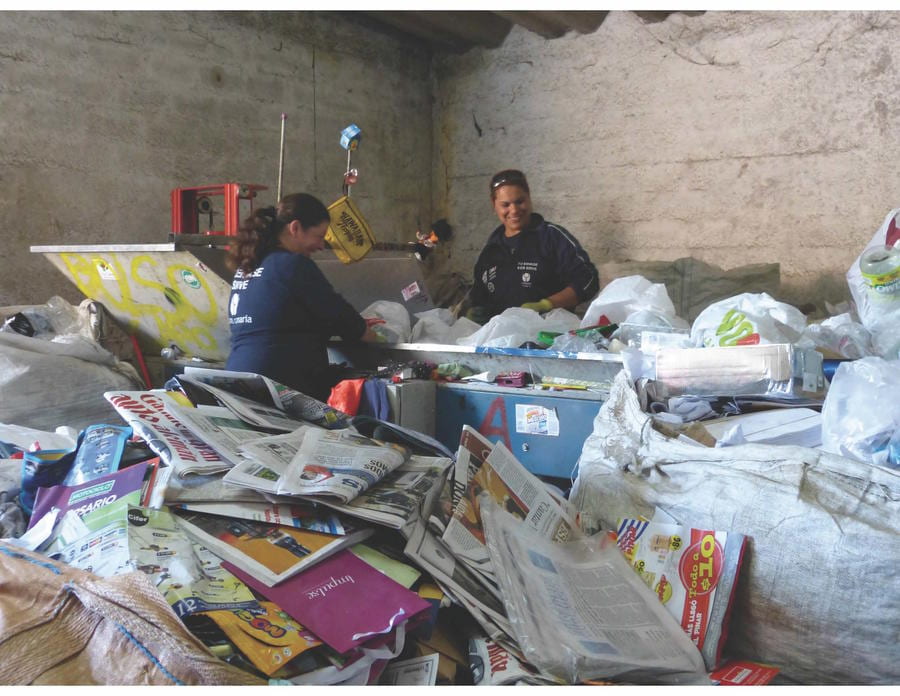
Women from an Uruguayan cooperative sort materials at their recycling center during the field vist of WIEGO team retreat in Montevideo, October 2013. Photo by Pat Carney.
As a middle-income region, Latin America falls at the mid-point in terms of waste generated and collected. It is also known for its large numbers of informal waste pickers. Some cities and countries in the region take into account the critical roles that informal waste pickers play in recycling waste by reducing the amount of waste that goes to dumps, landfills or incinerators, and thereby reducing the costs to the city and the environment. This article summarizes promising examples of the organization of waste pickers and their integration into solid waste management systems in Brazil and Colombia.
ORGANIZATION OF WASTE PICKERS IN LATIN AMERICA
Throughout Latin America, large numbers of people from low-income and disadvantaged communities make a living collecting and sorting waste and then selling reclaimed waste through intermediaries to the recycling industry. Although they create value from the waste generated by others and although they contribute to reducing carbon emissions, waste pickers are rarely treated with respect for the services they provide.
Privatization of public services, including waste collection, threatens their livelihoods, as an increasing number of municipal governments are issuing exclusive contracts to private companies for the collection, transport, and disposal of waste and recyclables. The first membership-based organization (MBO) of waste pickers in Latin America was founded in 1962 in Medellín, Colombia. By the 1980s, organizing among waste pickers began to spread across that country encouraged, in large part, by non-governmental organizations (NGO). Meanwhile, in 1980, the first MBO of waste pickers in Ecuador was founded in Cochabamba. Also in the 1980s, in Brazil, NGOs linked to the Catholic Church began to organize waste pickers in the main cities of the south and southeast region. The engagement of faith-based NGOs with the urban poor was a main driver for the formation of the first MBOs of waste pickers in that country.
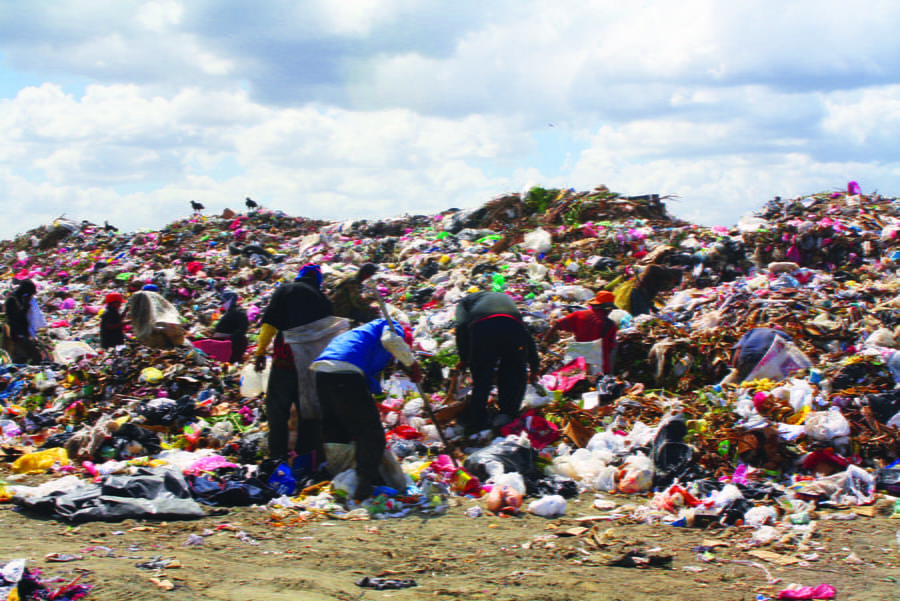
Waste pickers work in one of the world’s largest dumpsites, “La Chureca,” in Nicaragua, where WIEGO is conducting a research-action project in more than 19 dumpsites around the country, together with local university and national waste-picker organization. Photo by Lucía Fernández.
By the 1990s, the first efforts to integrate waste pickers, through their cooperatives, into municipal solid waste management systems began in Brazil (see below). During the first decade of the 21st century, the organizing and mobilizing of waste pickers in Latin America accelerated.
INTEGRATION OF WASTE PICKERS IN SOLID WASTE MANAGEMENT IN LATIN AMERICA
The first efforts to integrate waste pickers, and their cooperatives, into municipal solid waste management took place in Brazil: beginning in Porto Alegre and Sao Paulo in 1989, then Belo Horizonte in 1993 and Santo Andre in 1997. Concerns about the environment and the livelihoods of the urban poor, as well as the need to upgrade existing solid waste management systems, prompted municipalities to integrate waste pickers.
A National Forum called Waste and Citizenship, launched in 1998 under UNICEF leadership, helped increase the visibility of waste pickers and their integration into solid waste management in Brazil. This visibility had an impact nationwide, as it inspired other groups of waste pickers to get organized, creating the basis for social activism that later led to the creation of the Brazilian national movement of waste pickers (Movimento Nacional dos Catadores de Materiais Recicláveis, MNCR). Although there are still many challenges to fully integrating waste pickers, the National Waste Policy approved in 2010 recognized their relevance and created a legal framework which enables their cooperatives to be contracted as service providers, including at the World Cup, as mentioned above.
For more than two decades, waste pickers in Colombia have struggled to continue waste picking and have filed legal claims to preserve their occupation. The Asociación de Recicladores de Bogotá (ARB), an umbrella association of cooperatives representing more than 2,500 waste pickers in Bogotá, has played a key role in aggregating claims and taking the legal cases forward. Thanks to the efforts of ARB and others, the Constitutional Court of Colombia passed three landmark judgments in support of waste pickers and their right to earn a livelihood: the first, in 2003, ruled that the tendering process for sanitation services by municipal governments had violated the basic rights of the waste-picking community; a second ruling in 2010 mandated that cooperatives of waste pickers—not only private corporations—had the right to bid for solid waste management contracts; and the third, in 2011, halted a scheme to privatize solid waste management in Bogotá and ordered the municipality and the ARB to come up with a concrete proposal to integrate waste pickers by the end of March 2013.
In December 2012, the current municipal government of Bogotá de-privatized half of the waste collection, transport and disposal in the city and developed a system for paying waste pickers to collect, transport and recycle waste. With the help of WIEGO and other allies, the ARB prepared and submitted a bid to the municipal government. In March 2013, the municipal government began to pay waste pickers in Bogotá to collect, transport, and sort recyclable waste. More than 7,000 waste pickers are currently being paid for these services. Also, the current municipal government introduced a scheme to replace horse-drawn vehicles with motorized vehicles, providing loans to horse-cart owners to purchase trucks. As of June 2014, 2,800 owners of horse-drawn vehicles had purchased trucks.
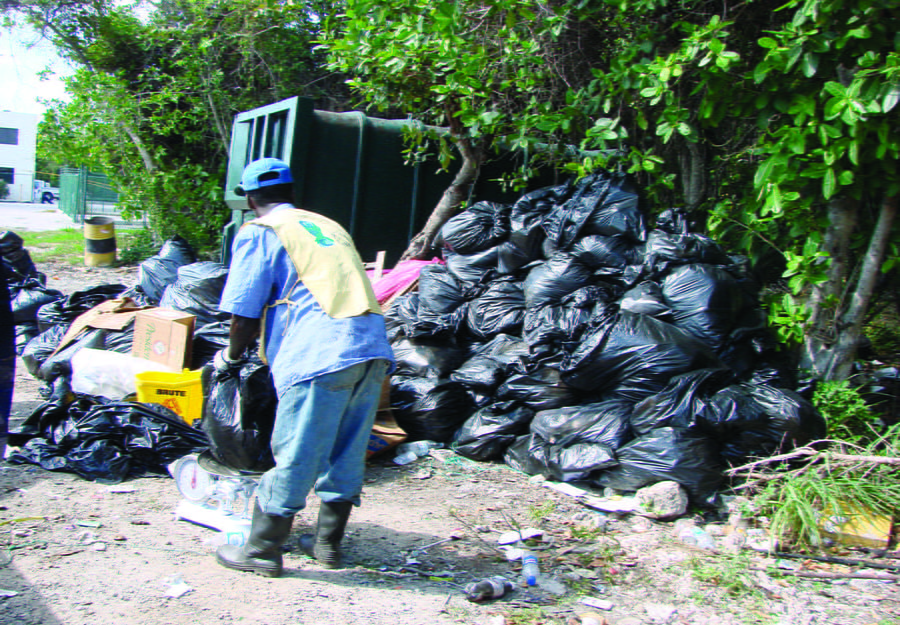
A worker sorts the trash in a mini-dumpsite in Punta Cana, Dominican Republic. Photo by Víctor Ojeda.
Under a recent national decree, upholding the December 2011 order of the Constitutional Court, cities across Colombia have been mandated to develop solid waste management schemes which recognize and pay waste pickers to collect, transport and sort recyclable waste.
FUTURE OF WASTE—AND WASTE PICKERS—IN LATIN AMERICA
Recycling waste is one key driver of environmental sustainability (reducing greenhouse gas emissions) and of the economy (supplying raw materials and packaging materials). Waste pickers are the principal actors in reclaiming waste for the recycling industry. Where others see trash or garbage, the waste pickers see paper, cardboard, glass and metal. They are skilled at sorting and bundling different types of waste by color, weight, and end use for sale to the recycling industry. But recycling is big business dominated by large private corporations. And many cities are privatizing solid waste management, issuing contracts to large private corporations.
What the waste pickers and their organizations want is quite clear: a) recognition for the services they provide; b) access to waste; c) trucks, space, and equipment for hauling, storing and compacting-bundling-processing waste; d) the right to bid for solid waste management contracts; and e) fair prices for the waste they collect and the recycled materials that they reclaim, process and sell.
The future for millions of waste pickers in Latin America hangs in the balance, depending on the perspective, policies and practices of municipal governments and large corporations. Municipal governments have to make choices about solid waste management: whether to retain it as a public function with or without integrating waste pickers or privatize it by issuing contracts to large corporations with or without stipulating that the corporations have to integrate waste pickers. If waste pickers are to be integrated, cities and corporations have to decide whether to issue contracts to their associations or hire them as employees. The waste pickers want their organizations to be contracted to provide waste collection, transport and recycling services. That needs to be done to prevent the problem of waste from becoming insurmountable in Latin America.
Winter 2015, Volume XIV, Number 2
Marty Chen is a Lecturer in Public Policy, Harvard Kennedy School; Affiliated Professor, Harvard Graduate School of Design, and International Coordinator, WIEGO Network.
This article draws on the expertise and publications of WIEGO colleagues who work with waste pickers in Latin America and around the world: Sonia Dias in Brazil, Lucía Fernández in Uruguay and Federico Parra in Colombia.
Related Articles
Garbage: Editor’s Letter
Religion is a topic that’s been on my ReVista theme list for a very long time. It’s constantly made its way into other issues from Fiestas to Memory and Democracy to Natural Disasters. Religion permeates Latin America…
Buenos Aires, Wasteland
English + Español
Walking down Avenida Juan de Garay last week, I passed a giant black trash bag that had ballooned and burst. Orange peels, tomatoes, candy wrappers…
Zero Waste in Punta Cana
I never imagined that my job at a leading Dominican resort would be so dirty—at least not at the beginning. I spent my first months as environmental director of…


